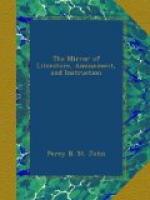Scenic Description.
Good as are the descriptions of quiescent objects, it is in his treatment of events,—of the visible operations of man, or of the elements,—that the author displays most power. What have we finer of its kind, than the storm in the Antiquary? The sullen sunset—the advancing tide—the rocks half hidden by the rising foam—the marks of promised safety fading from sight, and with them the hope they nourished—the ledge which the sufferers gained with difficulty—on the one side, a raging sea, and on the other, a barrier that forbade retreat! Guy Mannering contains another masterpiece—the night attack of Portanferry, witnessed by Bertram. We feel as though we were that person—we see and hear all of which his eyes and ears had cognizance; and the impression is the more strong, because the writer has told only that, and left the rest to our imagination. This illustrates one feature of the author’s skill. He knows the effect producible by leaving circumstances in the incompleteness and obscurity in which they often present themselves to the senses of a single person; he tells just what that person could have perceived, and leaves the sketch to be finished by his reader. Thus, when Porteous is hurried away to execution, we attend his ruthless conductors, but we wait not to witness the last details, but flee with Butler from the scene of death, and looking back from afar, see through the lurid glare of torches a human figure dangling in the air—and the whole scene is more present to our minds, than if every successive incident had been regularly unfolded. Thus, when Ravenswood and his horse vanish from the sight of Colonel Ashton, we feel how the impressiveness and beauty of the description are heightened by placing us where the latter stood,—showing us no more than he could have witnessed, and bidding our imaginations to fill up the awful doubtful chasm.




